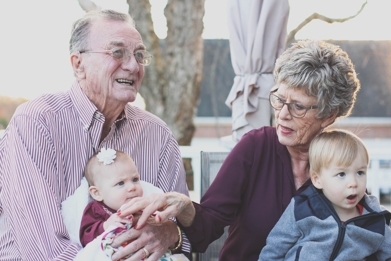 Throughout this blog series, we’ve discussed how divorce can affect children of different ages, as well as what parents can do to help mitigate avoidable hardships throughout the transition. In our last blog, we touched on the “grey divorce phenomenon”, i.e. the increase in divorce rates amongst an older generation, that has made headlines the last couple of years. With more couples divorcing after 30+ years of marriage, there are in turn more adult children who are now learning how to come to terms with a shifting family dynamic. In similar stride, these divorces can also have a profound effect on the third generation, grandchildren, who are witnessing the separation of their family unit, as well as witnessing their parents go through personal hardship. For this blog, we’ll be focusing on the effect that divorce can have on grandchildren.
Throughout this blog series, we’ve discussed how divorce can affect children of different ages, as well as what parents can do to help mitigate avoidable hardships throughout the transition. In our last blog, we touched on the “grey divorce phenomenon”, i.e. the increase in divorce rates amongst an older generation, that has made headlines the last couple of years. With more couples divorcing after 30+ years of marriage, there are in turn more adult children who are now learning how to come to terms with a shifting family dynamic. In similar stride, these divorces can also have a profound effect on the third generation, grandchildren, who are witnessing the separation of their family unit, as well as witnessing their parents go through personal hardship. For this blog, we’ll be focusing on the effect that divorce can have on grandchildren.
Every grandparent has a different type of relationship with their grandchildren; some of closer, and some are more distant, whether that be due to physical location or familial tension. Regardless, grandparents often hold a special place in grandchildren’s hearts. Many people hold fond memories of staying at their grandparent’s house—receiving special treats, enjoying certain traditions and gleaning wisdom from their first generation relative. In addition to this, married grandparents are often seen as the pinnacle of a strong and lasting marriage, serving as an example to young children that love and marriage can stand the test of time.
Thus, when these relationships end in divorce, it can be confusing and highly emotional for grandchildren. On top of seeing the family dynamic change, and having to work through the grief and nostalgia that can accompany these transitions, grandchildren may also feel tension in their own household as their parents try to come to terms with the news of the divorce. Adult children tend to carry a heavier burden when their parents get divorced—they may be more directly involved in the divorce process, the emotional baggage, and sometimes make take on the responsibility of taking care of their newly divorced and elderly parent. This emotional turmoil and added responsibility can create stress and frustration in the household, which can have a trickle-effect into the lives of grandchildren.
 When telling grandchildren about the upcoming divorce, treat the situation similar to how any parent would tell their children the news: reassure them that this divorce is in no way an indicator to how much the grandchild is loved. Remind them that they will always be your special grandchild, and that you will always be their grandparent, regardless of marital status. In addition to this, keep your grandchildren out of the nitty-gritty of your divorce. It’s okay to be honest and explain general reasons for the divorce, but refrain from expressing negative opinions about your spouse to them.
When telling grandchildren about the upcoming divorce, treat the situation similar to how any parent would tell their children the news: reassure them that this divorce is in no way an indicator to how much the grandchild is loved. Remind them that they will always be your special grandchild, and that you will always be their grandparent, regardless of marital status. In addition to this, keep your grandchildren out of the nitty-gritty of your divorce. It’s okay to be honest and explain general reasons for the divorce, but refrain from expressing negative opinions about your spouse to them.
This being said, children will be looking closely to see if these promises are true. So, to the best of your ability, remember to reach out to your grandchildren when you can. Try to create new environments that feel familiar and will help facilitate new memories and new traditions. In addition to this, talk to your spouse about how you plan to handle family events. There will be moments when it would be in your grandchild’s best interest to have both grandparents present—be prepared for those, because your desire to not miss the big events of their lives will speak volumes.
If you’re a grandparent who is going through a divorce, remember that this will be a loss for not only your children, but their children as well. Don’t let this reality serve as a form of guilt, but rather a form of awareness so that you can be proactive in combating any unnecessary experiences that would be difficult for your grandchildren. Remember: most grandchildren just want to be reassured that Grandma and Grandpa still love them, and that the sweet moments and memories will continue. This is absolutely possible post-divorce, so long as you have a mindful outlook and a proactive approach in remaining an active member of their lives.

